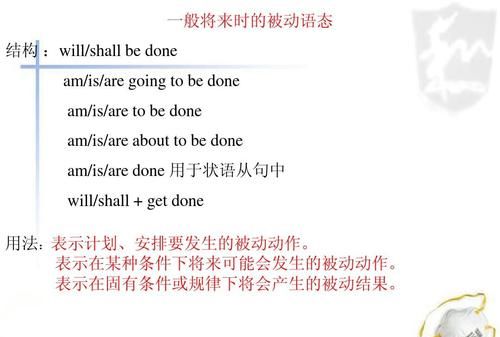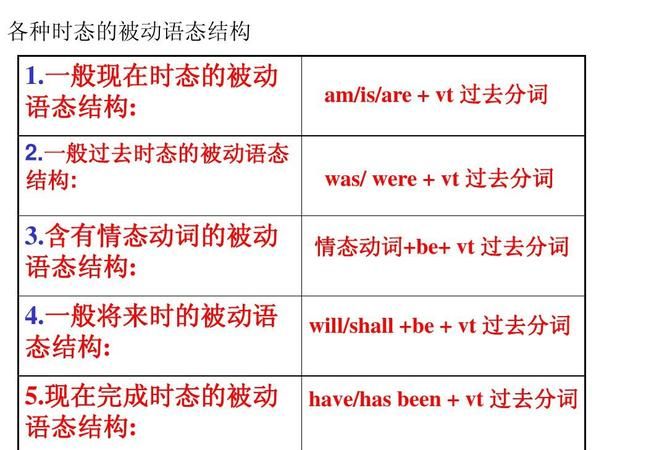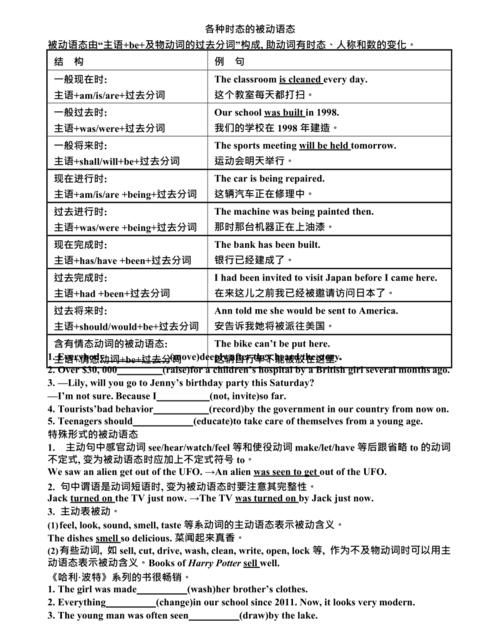本文目录
英语被动语态例子100个
被动语态八注意 1.我们知道,主动语态变为被动语态时,通常将主动语态中的宾语变为被动语态的主语;主动语态的主语变为由介词by引导的宾语;谓语动词变为被动语态“be 过去分词”形式,例如: Everyonelikestheinterestingfilm.(主动语态)→Theinterestingfilmislikedbyeveryone.(被动语态) Theyusedknivestocutthings.(主动语态)→Knivesareusedtocutthings.(被动语态) 但是,并非所有由“be 过去分词”构成的形式就是被动语态。有时过去分词已经变为形容词,表示一种状态。试比较: MybrotherisveryinterestedinEnglish.我哥哥对英语非常感兴趣。(状态) MybrotherwasinterestedbywhatItoldhim.我告诉他的话让我哥哥非常感兴趣。(动态) 2.在被动语态中谓语动词一定是及物动词,也就是说必须跟宾语的动词。如: Wecanmakemetalsintodifferentshapes.(主动语态)→Metalscanbemadeintodifferentshapes.(被动语态) 在主动语态中make是及物动词,其动作的承受者即宾语是metals。 但是,并非所有的及物动词都有被动语态。比如,表示静态的动词(have、belongto)、宾语是反身代词或相互代词等。例如: Hehasanicehouse.他有一所漂亮的房子。 Wemusthelpeachother.我们应该互相帮助。 3.主动语态中的主语在变为被动语态时通常变为由介词by的引出的宾语。如: Theyhavealreadycutdownthetrees.→Thetreeshavealreadybeencutdownbythem.那些树木已经被他们砍光。 如果谓语动词是know,在变为被动语态时,原来的主语变为由to引出的宾语。如: Maypeopleknowhimverywell.→Heiswellknowntomanypeople.很多人都非常了解他。 注意:我们之所以用被动语态是因为我们不清楚动作的执行者、或没有必要指出动词的执行者等。因此很多被动语态没有由by引出的宾语。如: Peoplemaylosetheirlivesandhomesortheymaybeinjuredbadlyinafire.在大火中人们可能失去性命和家园,要不就是严重烧伤。 Itisusedforprotectingthefiremanfromsmoke.它用来保护消防人员以避免吸进烟雾。 4.在主动语态变为被动语态时,时态一般应保持一致。如: Wewillbuildmorefactoriesinmyhometown.→Morefactorieswillbebuiltinmyhometown.我们家乡将要建起更多的工厂。 为此,我们必须记住以下某些时态的被动结构: do(es)→is/am/aredonedid→was/weredone have/hasdone→have/hasbeendonewilldo→willbedone bedoing→bebeingdone 5.某些动词可以跟双宾语如give、pass、bring、write;buy、make等,在变为被动语态时如果直接宾语变为被动语态中的主语,则间接宾语通常由介词to、for引出。例如: Mysistergavemeanicewatchformybirthday.→Anicewatchwasgiventomebymysisterformybirthday.我过生日时收到了姐姐的一块手表。 Theyhaveboughtusmanybooks.→Manybookshavebeenboughtforusbythem.很多书都是由他们给我们买的。 6.某些动词make、hear、see、watch等在主动语态中,其宾语补足语要求用不带to的不定式。但在变为被动语态时通常省略的不定式符号to必须恢复。如: Hemadeuscleantheclassroomafterschool.→Weweremadetocleantheclassroomafterschool.我们被迫在放学后打扫教室。 Isawhimcomeintotheroom.→Hewasseentocomeintotheroom.人们看见他进了屋子。 7.在主动语态中如果谓语动词是含有介词或副词的短语动词,变为被动语态时不能丢掉该介词或副词。如: Theymusttakegoodcareofthechildren.→Thechildrenmustbetakengoodcareof.孩子们必须小心照看。 8.英语中某些动词如sell、lock、draw、start等在否定句、进行时或用在某些形容词、副词前可以表示被动意义。如: Thiskindofbookssellswell.这种书畅销。 Thedoorwon’tlock.门锁锁不上。
1.定义:被动语态,即不知道动作执行者或强调动作承受者的一种语态。例如中文常说:我被他打,这就是一种被动。但有时由于句子结构上的需要也要用被动,例如Itisnotunusualforworkersinthatregiontobepaidmorethanamonthit在句中作形式主语。而不定式tobepaidmorethanamonth是句子的逻辑主语。结合选项全句的意思是:“那个地方的工人一个多月后才得到工资是常有的事”。 2.构成:be pastparticiple(过去分词)(简称P.P.)( by 动作执行者)(过去分词的概念见上课) 3.当主动语态要被改成被动的时候,我们把原句的宾语提前,作为改句的主语,主语后置,作为宾语。因此有一点要注意,不及物动词由于不加宾语,没有被动形式,但不及物动词如果与某些介词构成介词短语,可以用被动。例如Thefirehadbeenputoutbeforethefiremanarrived.Put是不即物动词,但putout是及物动词 4.应用到各种时态和句型如下: ①一般式(一般现在,一般过去,一般将来):am,is,are,was,were,isgoingtobe,willbe done.ie.Onceenvironmentaldamageisdone,ittakesmanyyearsforthesystemtorecover.本句的意思是:“环境一旦遭到破坏,需要多年时间才能恢复过来。”do作为及物动词有“引起,产生”的含义,dodamage的意思是“造成破坏”。主语damage是及物动词do的动作对象,谓语应当用被动语态。同样的,还有,Iwillmendthemachine.相当于Themachinewillbemended(byme). ②进行时(现在进行、过去进行、将来进行):be being P.P.ie.Theclassroomisbeingcleaned. ③完成时(现在完成、过去完成、将来完成):have/hasbeen P.P.:例如Themachinewillhavebeenrepairedby3o’clockthisafternoon.再如:Myhomeworkhasbeenfinished. ④其他时态依词类推,可得到结果。 ⑤情态动词的被动语态:主语 情态动词 be动词 动词过去分词,例如Yourteethmustbebrushed. ⑥不定式的被动语态:tobedone例:Theno-showshavetobeconsideredwhendecidingtherateofoverbooking.(确定超过接待能力的预定时必须考虑预定了房间却来不了的客人。)

五个被动语态的英语句子加翻译
被动语态
(一)语态分类
英语动词有两种语态,主动语态和被动语态。主动语态表示主语是动作的执行者,被动语态表示主语是动作的承受者。如:
They will build a new bridge over the river. (主动)
A new bridge will be built over the river. (被动)
汉语中常用“被”、“给”、“由”、“受”等词用来表示被动,而英语用:助动词be+ 及物动词的过去分词构成。
(二)被动语态的时态、人称和数的变化
主要体现在be的变化上,其形式与系动词be的变化形式完全一样。
〔注〕被动语态没有将来进行时和过去将来进行时。
(三)被动语态常用的八种时态
1. 一般现在时
People grow rice in the south of the states.
Rice is grown in the south of the states.
The school doesn't allow us to enter the chemistry lab without a teacher.
We are not allowed to enter the chemistry lab without a teacher.
2. 一般过去时
They agreed on the building of a new car factory last month.
The building of a new car factory was agreed on last month.
He had a strange way of making his classes lively and interesting.
And the students didn't forget his lessons easily.
He had a strange way of making his classes lively and his lessons were not easily forgotten.
3. 一般将来时
They will send cars abroad by sea.
Cars will be sent abroad by sea.
They will give plenty of jobs to school-leavers.
Plenty of jobs will be given to school-leavers.
4. 过去将来时
The manager said they would complete the project by the end of the year.
The manager said the project would be completed by the end of the year.
The workers told me they would mend the car as soon as possible.
The workers told me that the car would be mended as soon as possible.
5. 现在进行时
The radio is broadcasting English lessons.
English lessons are being broadcasted on the radio.
——Have you moved into the new house?
——Not yet. We are painting the rooms.
The rooms are being painted.
6. 过去进行时
——Why didn't they drive there on time?
——Because the workers were mending the road.
Because the road was being mended.
This time last year we were planting trees here.
Trees were being planted here this time last year.
7. 现在完成时
Someone has told me the sports meet might be put off.
I have been told the sports meet might be put off.
We have brought down the price.
The price has been brought down.
8. 过去完成时
When I got to the theatre, I found they had already sold out the tickets.
When I got to the theatre, I found the tickets had already been sold out.
The whole country was very sad at the news of his death; People had considered him to be a great leader.
He had been considered to be a great leader.
9. 含有情态动词的被动语态
含有情态动词的被动语态是由“情态动词+ be+ 及物动词的过去分词”构成。
The teacher said, “You must hand in your compositions after class. ”
The teacher said, “Your compositions must be handed in after class. ”
He can write a great many letters with the computer.
A great many letters can be written with the computer by him.
(四)被动语态的使用
1. 当不知道或没有必要指出动作的执行者时,常用被动语态,这时往往不用by短语。
“Mr. White, the cup with mixture was broken after class. ”(只是告诉老师杯子坏了,不知是谁弄坏的,或不想说出谁弄坏的)。
2. 突出或强调动作的承受者,如果需要说出动作的执行者,用by短语。
These records were made by John Denver.
The cup was broken by Paul.
3. 当汉语句子的主语既不是动作的执行者,也不是动作的承受者时,这时常用in+ 名词作状语,而代替by短语。
These cars were made in China.
15, 000 cars will be produced each year in the new factory.
(五)主动语态变被动语态的方法
1. 把主动语态的宾语变成被动语态的主语。
2. 把主动语态的谓语变成被动语态的be+ 过去分词,时态要与原句保持一致。
3. 把主动语态的主语变为介词by的宾语,放在被动语态里谓语动词之后,by短语可以省略。如果原句主语是地点名词,在被动语态中用in+ 地点名词作状语。如:
My aunt invited me to her dinner party.
主语 谓语 宾语
I was invited (by my aunt )to her dinner party.
主语 谓语 宾语
The school set up a special class to help poor readers.
A special class to help poor readers was set up in the school.
(六)语态转换时所注意的问题
1. 把主动语态变为被动语态时,其谓语动词的时态要与原句时态保持一致,其谓语动词的数要与新主语保持一致。
We have bought a new computer.
A new computer has been bought. (正确)
A new computer have been bought. (错误)
2. 含有双宾语的主动句变被动句时,可分别将其中的一个宾语变为主语,另一个不动,一般变间接宾语为主语时比较多。
My uncle gave me a present on my birthday.
I was given a present on my birthday.
如果把直接宾语(指物)改为主语,则在间接宾语(指人)前加适当的介词,如上句还可以说:
A present was given to me yesterday.
注意:一般在下列动词后,常在间接宾语前用介词to,如:
bring, give, hand, lend, offer, pass, pay, promise, sell, show, take, teach, tell等。
The magazine was passed on to me.
The cup with mixture was showed to the class.
My bike was lent to her.
一般在下列动词后,间接宾语前用介词for, 如:
build, buy, cook, cut, choose, do, fetch, find, fix, get, keep, make, order, paint, play, sing等。
Mother made me a new skirt.
A new skirt was made for me.
The meat was cooked for us.
Some country music was played for us.
有些既不用to也不用for, 根据动词与介词的搭配关系。
He ask me a question.
A question was asked of me.
People all over the world know the Great Wall.
The Great Wall is known to people all over the world. (不用by短语)
3. 由动词+ 介词或副词构成的短语动词,要把它们作为整体看,即把它们看成一个及物动词,介词或副词不可拆开或漏掉。这类动词有:
不及物动词+ 介词,如: agree to, ask for, laugh at, operated on, listen to, look after, think of, talk about等。
The patient is being operated on.
The problem is solved. It needn't be talked about.
及物动词+ 副词:如:bring about, carry out, find out, give up, hand in, make out, pass on, point out, put away, put off, think over, turn down, work out, turn out等。
His request was turned down.
The sports meet will be put off because of the bad weather.
4. 带复合宾语(宾语+ 宾补)的动词改为被动语态时,一般把主动结构中的宾语改为主语,而宾语补足语保留在谓语动词后面。如:
We always keep the classroom clean.
The classroom is always kept clean.
She told us to follow her instructions.
We were told to follow her instructions.
注意:在see, watch, hear, notice, listen to, look at, make, feel等动词后作宾语补足语的动词不定式都不带to,但改成被动语态后都带to,这时不定式为主语补足语,也就是说不定式作主语补足语不存在省略to的问题。
We often hear him play the guitar.
He is often heard to play the guitar.
The earthquake made the road fall onto another one below.
The road was made to fall onto another one below by the earthquake.
注意:带有复合宾语的句子,如果宾语补足语是名词,变被动句时,应将宾语变为主语,不要误把宾语补足语的名词作主语。如:
Tomatoes were first taken back to Europe and people called them love apples.
误:Love apples were called them.
正:They were called love apples.
5. 还有一种短语动词由动词+ 名词+ 介词构成,变被动语态有两种形式,如下:
1)We take good care of the books.
�The books are taken good care of.
Good care is taken of the book.
2)You must pay attention to your pronunciation.
Attention must be paid to your pronunciation.
Your pronunciation must be paid attention to.
用于这类结构的短语动词常见的有:catch sight of, make use of, pay attention to, set fire to, take care of, take hold of, take notice of, keep an eye on等。
6. 当主动句的主语是nobody, no one等含有否定意义的不定代词时,被动句中将其变为anybody, 作by的宾语,并将谓语动词变为否定的被动语态。如:
Nobody can answer this question.
误:The question can be answered by nobody.
正:The question can not be answered by anybody.
7. 当否定句中的宾语是anything, anybody, anyone等不定代词时,在被动句中应将其分别变为nothing, nobody, no one作主语,并将谓语动词变为肯定的被动语态。如:
They haven't done anything to make the river clean.
误:Anything hasn't been done to make the river clean.
正:Nothing has been done to make the river clean.
8. 以who为主语开头的疑问句,变被动时,用by whom放在句首:
Who wrote the story?
误:Who was the story written?
正:By whom was the story written?
9. 有些动词既是及物又是不及物,当它们和well, badly, easily等副词连用时,表示主语内在品质或性能,是不及物动词,用主动表示被动,这时不用被动语态,常见的有:write, read, clean, sell, wash, cook等。如:
The cloth washes easily. 这布很好洗。
The new product sells well. 这新产品很畅销。
The pen writes smoothly. 这支笔写字很流畅。
The books sell well. (主动句)
对比:
The books were sold out. (被动句)
The meat didn't cook well. (主动句)
对比:
The meat was cooked for a long time over low heat. (被动句)
10. 下列情况主动句不能改为被动句:
第一,感官系动词一般用主动形式表示被动意义,如:feel,look, seem, taste, sound, remain等。
——Do you like the material?
——Yes, it feels very soft.
误:It is felt very soft.
The food tastes delicious.
误:The food is tasted delicious.
The pop music sounds beautiful.
误:The pop music is sounded beautiful.
第二,谓语是及物动词leave, enter, reach, suit, have, benefit, lack, own等。如:
He entered the room and got his book.
误:The room was entered and his book was got.
She had her hand burned.
误:Her hand was had burned.
第三,一些不及物动词短语没有被动语态,如:take place, break out, belong to, lose heart, consist of, add up to等。如:
The fire broke out in the capital building.
误:The fire was broke out in the capital building.
第四,不及物动词没有被动语态,如:rise, happen, succeed, remain, lie等。
1)When we got to the top of the mountain, the sun had already risen.
误:The sun had already been risen.
2)After the earthquake, few houses remained.
误:After the earthquake, few houses were remained.
第五,宾语是反身代词,相互代词,同源宾语,不定式,v-ing形式及抽象名词等,不能变为被动句子的主语,如:
I taught myself English.
误:Myself was taught English.
We love each other.
误:Each other is loved.
11. 汉语有一类句子不出现主语,在英语中一般可用被动结构表示,如:
据说……It is said that…
据报导……It is reported that…
据推测……It is supposed that…
希望……It is hoped that…
众所周知……It is well known that…
普遍认为……It is generally considered that…
有人建议……It is suggested that…
1)It is reported that it is going to rain tomorrow.
2)It is well known that Thomas Edison invented the electric lamp.
在英语语言中,被动语态是极常见的语言现象,人们进行语言交际,离不开对被动语态的使用,熟练掌握被动语态也为下一步学习打下良好的基础,在动词-ing形式,不定式等结构中,都有被动式,都需要运用被动语态的知识去理解。

英语被动句有哪些类型
1、We are not allowed to enter the chemistry lab without a teacher.
我们不被允许在没有老师的情况下进入化学实验室。
2、The building of a new car factory was agreed on last month.
建立一个新的汽车工厂在上个月被一致同意。

3、Their lessons were not easily forgotten.
他们的功课没有被轻易遗忘。
4、Cars will be sent abroad by sea.
汽车通过海路被送到国外。
5、Plenty of jobs will be given to school-leavers.
大量的工作将被提供给中途辍学者。
关于英语被动语态的思维导图
三、被动语态的用法:
1、不知道或没有必要指出谁是动作的执行者时。
The bridge was built last year.这座桥是去年建造的。
He was elected chairman.他被选为主席。
2、 当更加强调动作的承受者时。此时动作的执行者由by引导置于谓语动词之后,不需要时可以省略。
The room hasn't been cleaned yet.房间还没有打扫。
The tiger was killed by him.老虎被他杀死了。
3、当动作的执行者不是人时,多用被动语态。如:
The window was blown by wind.窗户被风吹开了。
The whole village has been washed away by the flood.整个村庄都被洪水冲走了。
4、表示客观的说明常用"It is + 过去分词."句型。
It is said that Lucy has gone abroad.据说露茜已经出国了。
It is believed that he is a spy. (=He is believed to be a spy.)大家相信他是个间谍。
其它常见的"It is + 过去分词+ that"句型还有
It is reported that…据报道
It is said that…据说
It is believed that…大家相信
It is suggested that…有人建议
四、主动语态变为被动语态
转换图示:
1、主动语态变为被动语态的步骤:
(1)将主动句的宾语变为主语:
注意:如果主动句的宾语是代词,需将其由宾格变为主格。如:
Tom killed him. → He was killed by Tom.
(2)将动词改为"be+过去分词"。
注意:
They held a meeting yesterday. → A meeting was held by them yesterday.
他们昨天开会了。
(3)将主动语态的主语改为be…放在谓语动词后。
注意:如果原主语是代词,则应由主格变为宾格。
He sang a song. → A song was sung by him.
2、主动语态变为被动语态的注意事项:
(1)主动句中的主语如果是people, we, you, they, somebody等含糊地表示"人们"、"大家"的单词,变为主动句时,通常删去"by…",但原主语被强调者除外。如:
They set up this hospital in 1975. → This hospital was set up in 1975.
这所医院建于1975年。
Only he can finish the job. → 只有他能完成这项工作。
The job can be finished only by him.这项工作只能由他来完成。
(2)含有双宾语,即直接宾语和间接宾语的句子,每个宾语都可变为被动语态的主语,即其被动语态有两种形式。但多以间接宾语作主语。
Jack told us the truth.杰克告诉了我们真相。
We were told the truth by Jack.
The truth was told (to) us by Jack.
五、动词的主动形式表示被动之意
以主动形式表示被动之意的动词多为连系动词,如:look, feel, smell等。下列动词没有被动式:happen, cost,take,have
An accident was happened yesterday.(×)昨天发生了一起事故。
An accident happened yesterday.( )
The flower smells sweet.这花闻起来很香。
The watch looks good.这表看起来很好。
This book sells well.这本书畅销。
六、各种时态的被动语态举例(以动词do为例)
1.一般现在时(am/ is/ are +done)
English is spoken by lots of people in the world. 世界上的许多人都说英语。
Class meeting is held every Thursday. 每周四都举行班会。
The classroom is cleaned by the students every day. 学生们每天都打扫教室。
2.一般过去时(was/ were +done)
The cup was broken by the boy. 杯子被那个男孩打碎了。
He was saved at last. 他最终获救了。
My bike was stolen. 我的自行车被偷了。
3.一般将来时与过去将来时(will/ shall be +done; would/should be +done)
A speech will be given this afternoon. 今天下午有一个演讲。
A new road will be built next year. 明年要修一条新马路。
I thought thousands of people would be helped. 我认为将有数千人得到帮助。
4.现在进行时与过去进行时(am/ is/ are being +done; was/ were being +done)
The machine was being repaired at this time yesterday. 昨天这时,机器正在被修理。
The problem is being discussed now. 问题正在被讨论。
A bus is being pushed by the passengers. 路人正在推一辆公共汽车。
5.现在完成时(have/ has been + done)
Two hundred trees have been planted by now. 到现在为止,已经种了二百棵树了。
The book has been read many times by me. 这本书已经被我读了许多遍了。
Several soldiers have already been killed in the conflict. 在冲突中已经有几名士兵被杀害。
6.过去完成时(had been+done)
They said they had been invited to the party. 他们说已经被邀请参加晚会了。
She found the house had been destroyed by the storm. 她发现房子已经被暴风雨摧毁。
He had been tortured by the illness for many years before he died.
他在去世前已经被疾病折磨很多年了。
请参考

以上就是关于英语被动语态搞笑的例子,英语被动语态例子100个的全部内容,以及英语被动语态搞笑的例子 的相关内容,希望能够帮到您。
